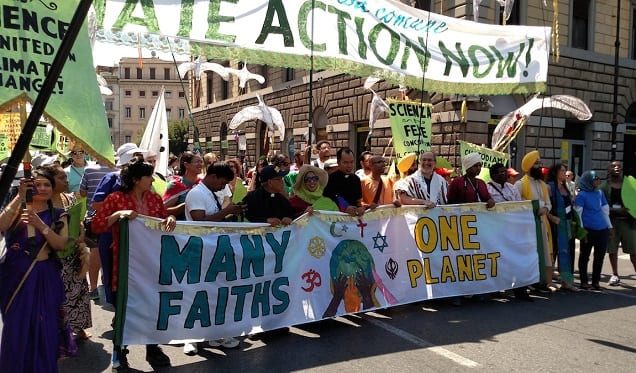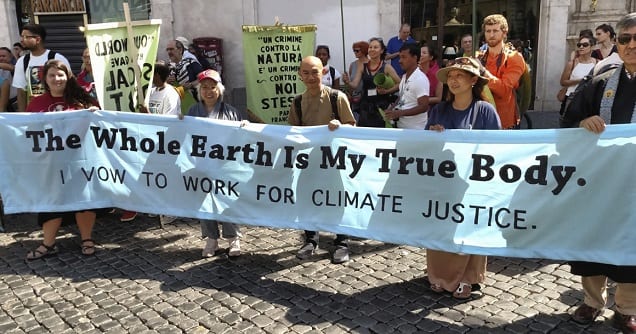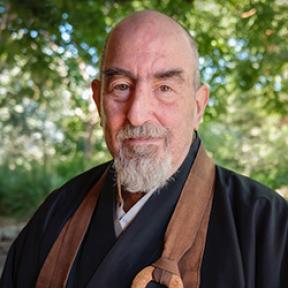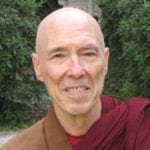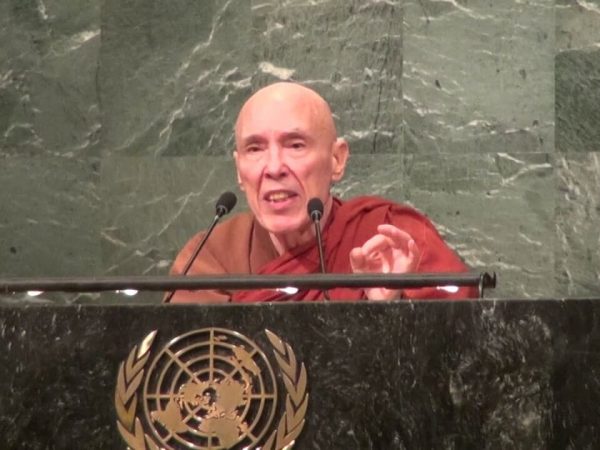The Buddha was enlightened under a tree. Sitting under that Bodhi tree on the banks of the Neranjana River, he was taunted by the demon king Mara who did his best to plant seeds of doubt. Mara asked by what right this man Gauthama claimed the seat of enlightenment. The Buddha remained steady in his meditation and simply reached down to touch the Earth. The Earth responded loudly: “I am your witness.” Mara fled and the Buddha continued to practice meditation. The Earth was partner to the Buddha’s work, as she must be our partner and our support.
In late June Pope Francis released his encyclical Laudato Si’/Praised Be, a passionate plea for environmental sanity and social/spiritual transformation. This eloquent document — subtitled On Care for Our Common Home — is addressed to “every person living on this planet,” inviting us all to take part in dialogue and action to protect our future, that of our children, and of all beings.
In the very first paragraph of Laudato Si’, Pope Francis references the lyrical work of his namesake Saint Francis of Assisi. In “Canticle of the Sun” St. Francis reminds us that:
…our common home is like a sister with whom we share our life and a beautiful mother who opens her arms to embrace us. “Praise be to you, my Lord, through our Sister, Mother Earth, who sustains and governs us, and who produces various fruit with colored flowers and herbs.”
For many of us Pope Francis is a breath of fresh air: a world religious figure who is not afraid to speak of the plight of the poor and the hazards of a “throwaway culture.” He can speak the truth bluntly, “The earth, our home, is beginning to look more and more like an immense pile of filth,” and argue wholeheartedly for an “integral ecology” which sees:
…a relationship between nature and the society which lives in it. Nature cannot be regarded as something separate from ourselves or as a mere setting in which we live. We are part of nature, included in it and thus in constant interaction with it.
Such understandings and concerns are certainly present within Buddhist traditions going back to the Buddha’s awakening. In recent decades we’ve seen the development of socially engaged Buddhism. But it seems to me we are still lacking a rigorous Buddhist equivalent to the “Social Gospel.”
We need a “Social Dharma” to care for our common home. This Social Dharma must reach across our different cultures and Buddhist traditions. That means to care for our bodies, our communities, and our planet. It means to understand the connections between climate change, poverty, racism, and militarism. All these are threads in the common garment of domination and oppression. To ignore them is to invite the destruction of all we cherish.
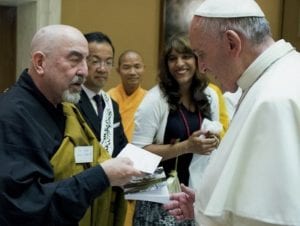
Rising in the early 20th Century from the squalor of the industrial revolution, the Social Gospel was a fresh approach to Christ’s message and Christian ethical teachings, which were interpreted in the light of social justice including poverty, racism, child labor, war, crime and much else. While earlier popes had addressed these issues in various ways, none in memory has been as outspoken as Pope Francis, so clear about the inequities of our world and the dangers of our way of life.
Again and again Pope Francis hammers home his Social Gospel in the pages of Laudato Si’:
Social problems must be addressed by community networks and not simply by the sum of individual good deeds. This task will make such tremendous demands of man that he could never achieve it by individual initiative or even by the united effort of men bred in an individualistic way…The ecological conversion needed to bring about lasting change is also a community conversion.
We need a “Social Dharma” to care for our common home…. to care for our bodies, our communities, and our planet.
As Buddhists we can embrace the Integral Ecology of the Pope’s message and place it at the heart of a Social Dharma. Integral Ecology is not Christian or Buddhist but truly human. The core Buddhist teachings and precepts are about our relationship to all beings, not treating anyone or anything as an object for our manipulation.
In the Zen tradition Master Dogen writes, “Understand that the ancient Buddha teaches that your birth is not separate from the mountains, rivers, and earth.” This means that we are responsible to and for the world we live in. Elsewhere, Master Dogen offers these encouraging words:
…Give flowers blooming on the distant mountains to the Tathagata. Offer treasures accumulated in our past lives to living beings…We offer ourselves to ourselves, and we offer others to others.
A gift at has been given to us to sustain, take care of, and share with everyone. The whole earth is my true body. We all stand on the same ground and this ground is unstable. The planet is at risk. Those who are poorest, those with the least access to resources suffer most. But, really, we are all threatened. In the light of interdependent reality, in the circle of giving and receiving we all suffer. So I ask can we let go of harmful things: fear, privilege, and the vain quest for comfort at the expense of others’ lives? In the spirit of Right View can we create a Social Dharma? In words from a fable written by my old teacher Robert Aitken Roshi:
Owl said, “What are Right Views?”
Brown Bear said, “We’re in it together and we don’t have much time.”
So…what shall we do? We don’t have much time.
